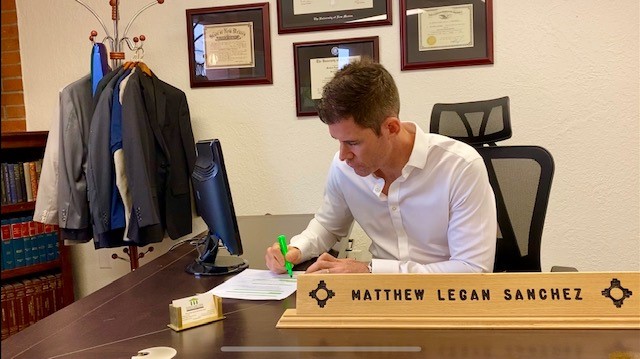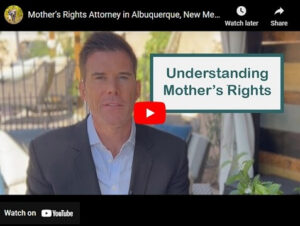
Mother’s Attorney Rights in Albuquerque, NM
MOTHER’S RIGHTS ATTORNEY IN ALBUQUERQUE, NEW MEXICO
Are you searching for a experienced and effective mother’s rights attorney?
Television ads and media soundbites are increasingly focusing on “Father’s Rights.” But what about mothers? What rights does a mother have over her child? Do mothers have more rights than fathers by virtue of giving birth to the child?
Let’s explore Mother’s Rights in Albuquerque, New Mexico.
BEST INTERESTS OF THE CHILD STANDARD REPLACES TENDER YEARS DOCTRINE IN NEW MEXICO
The Tender Years Doctrine
Part of the confusion with a mother’s rights has been caused by gradual changes to the legal system. In the past, family courts followed a “Maternal Presumption” or “Tender Years Doctrine.” This presumption resulted in mothers being automatically awarded child custody of the children – unless the father could demonstrate the mother was unfit to care for the child.
The last recorded New Mexico case that deals with the Tender Years Doctrine, was in 1963, with Ettinger v. Ettinger, 72 N.M. 300.
In Ettinger the trial court granted father custody of the parties’ two year old daughter. Mother appealed the ruling all the way to the Supreme Court, arguing that “It is universally recognized that the mother is the natural custodian of her young. In legal contests for the child custody of minor children, the law favors the mother.” Id. at 302.
The Court ultimately rejected mother’s argument, reasoning: “ . . . the rule that a mother should be given preference in awarding the custody of her children is not inflexible, nor is the mother entitled to the custody of a daughter as a matter of law, the welfare of the child being paramount, the preference in favor of the mother of young children being resorted to merely to aid the court to determine what is for the best interests of the children.” Id.
As you can see, even in 1963 New Mexico courts recognized that a custody determination should be based on a child’s best interests – not a default presumption in a mother’s favor.
Fast forward to 2021, and New Mexico courts exclusively rely on a child’s best interests when determining time-sharing and custody. The ghost of the Tender Years Doctrine still lingers, but the best interests of the child standard is alive, well, and the court’s primary focus.
Factors Impacting a Child’s Best Interests
Here are some of the factors that New Mexico courts consider when determining a child’s best interests:
- The child’s relationship and bonding with each parent;
- Each parents ability to adequately care for the child;
- Each parents willingness to accept parenting responsibilities;
- Can both parents can provide care without intrusion;
- Living distance between the parents; and
- Communication issues, if any.
HOW BEING A PRIMARY CAREGIVER IMPACTS THE CHILD’S BEST INTERESTS IN ALBUQUERQUE,NM
Instead of awarding mothers primary custody by default, Albuquerque, NM courts examine each parents’ ability to adequately care for the child and bonding with the child.
New Mexico courts focus on keeping a child’s life consistent and predictable. The court’s preference towards predictability, leads to examining the child’s “primary caregiver” before the separation.
In determining the primary-caregiver, the court looks at factors such as:
- Each parents level of bonding with the child;
- How each parent contributed to the child’s development;
- Each parents’ involvement with the child’s medical, education, and extra-curricular activities; and
- Each parents’ level of involvement with the child’s basic care and training.
A parent’s level of involvement with the child up to separation will influence the court’s decision regarding court ordered time-sharing.
HOW STATUS QUO IMPACTS YOUR COURT ORDERED TIME-SHARING IN NEW MEXICO
New Mexico courts favor predictability in a child’s life. Generally, a child’s primary-caregiver will have primary custody (i.e. the majority of time-sharing) with a child after separation.
In a sense, status quo is a domino effect that occurs from birth. From birth, one parent tends to act as the child’s primary care giver. When separation occurs, the primary caregiver tends to assume primary child custody by having the child a majority of the time.
The time-sharing that occurs from the date of separation becomes the “status quo” that gains momentum and impacts the court’s decision regarding the child’s best interests. New Mexico courts are heavily influenced by the status quo because they believe that children thrive with consistency and predictability.
MOTHER’S RIGHTS VS. FATHER’S RIGHTS IN ALBUQUERQUE, NM
A “red herring” is something that distracts or misleads from the more relevant or important question.
Focusing on a parent’s “rights” to child custody and time-sharing misleads from the more important questions – what is the child’s best interests.
Over the past decade of practicing law, I have observed that some parents think in terms of their “rights.” This is a red herring because NM family judges generally do not think in terms of “rights” between the parents. Judges are child-focused and think about the child’s best interests.
Joint Legal and Physical Custody
By law, New Mexico courts begin with the presumption that joint legal custody is in a child’s best interests.
Joint legal custody means that both parents have the authority to make decisions regarding a child’s education, religion, medical, and extra-curricular. Joint legal custody means that one parent cannot make major changes to a child’s life without the other parent’s approval.
Joint physical custody means that both parents have time-sharing with the child. New Mexico courts presume that it is in a child’s best interests for both parents to have time-sharing with a child. This presumption does not mean that a parent has a “right” to time-sharing, or to 50-50 time-sharing. Ultimately, the appropriate system of time-sharing is based on the child’s best interests — not an inherent right.
HOW NEW MEXICO COURTS DETERMINE TIME-SHARING
New Mexico courts determine time-sharing based on a child’s best interests. In determining the appropriate time-sharing, New Mexico courts are influenced by:
- Each parents bonding with the child;
- Who has acted as the child’s primary caregiver;
- What time-sharing have the parties’ followed since separating?
Suggested Visitation and Time-sharing Guidelines in Albuquerque ,NM
Albuquerque, NM courts are heavily influenced by the Suggested Visitation and Timesharing Guidelines. These guidelines are routinely used in Albuquerque to give parents consistent and predictable time-sharing schedules.
As we have seen, instead of focusing on “Mother’s Rights” a Mother should focus on the child’s best interests. Mothers’ should focus on the factors above that influence NM courts determination of the child’s best interests.
Check out this video for more information about mother’s rights in Albuquerque, NM.
MOTHER’S RIGHTS ATTORNEY NEAR ME IN ALBUQUERQUE, NM
Are you searching for a hard-hitting mother’s rights attorney in Albuquerque, New Mexico? Understanding Mother’s Rights in Albuquerque, New Mexico and the best interests of a child, often requires an experienced mother’s rights attorney in New Mexico. Matthew Legan Sanchez is an Albuquerque mother’s rights lawyer and can guide you through your child custody or divorce case in Albuquerque, New Mexico. Sanchez can be reached by calling (505) SANCHEZ.

Mother’s Rights Attorney in Albuquerque New Mexico







